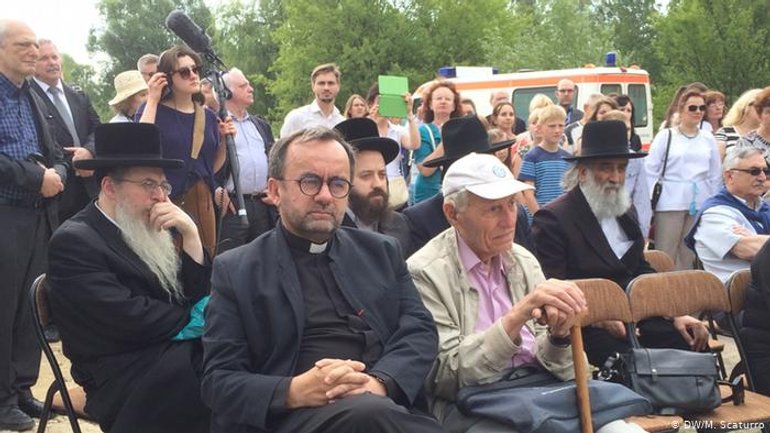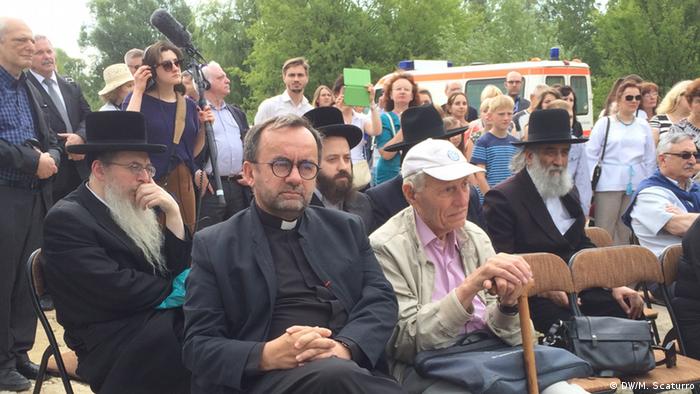Ukraine remembers Nazis' Jewish victims

More than a million Ukrainian Jews were murdered by German troops under Hitler. A German-government financed project has created the first five monuments in Ukraine honoring the dead. Michael Scaturro reports from Lviv.
The invasion of Ukraine in 1941 by German troops and the tragic events that followed were largely consigned to history among Ukrainians until the late 1990s, at which point around 2,000 sites of the Holocaust - mass graves where Jews were shot and in some cases buried alive - were uncovered by a French Catholic priest, Father Patrick Desbois, and his NGO, Yahad in Unum.
Desbois began his landmark research into the Germans' genocide against Ukraine's Jews by accident: He had been looking for the concentration camp where the Germans held his grandfather, a French partisan. His search led him to the town of Rava-Ruska. Today a sleepy village on the Polish border, Rava-Ruska was once a vibrant town where 42 percent of the residents were Jewish.
"Twenty five years ago, I learned that in Rava-Ruska there was a camp where 25,000 Soviet prisoners were killed by the Germans," Desbois said at the dedication ceremony in Rava-Ruska last week. "There was a memorial for the Soviet prisoners. But there were no memorials for the mass graves of the Jews."
The Germans under Hitler had planned to eradicate over half of Ukraine's population so that the country's rich farmland could be repopulated with Germans in their so-called quest for Lebensraum. By 1945, some three million non-Jewish Ukrainians had been murdered by the Germans.
Father Desbois explained that as tragic as this history was for Ukrainians, it was somewhat politicized by the Soviets, who wanted the murdered to fall under the category of "victims of fascism," when, in fact, the story is much more nuanced.
Recalling the atrocities
Initially, locals were unwilling to talk to Father Desbois about the Jewish victims of the Holocaust or, for that matter, the thousands of Ukrainian gentiles who risked their lives to protect Jews. They were also loath to talk about Ukrainian collaborators who themselves killed Jews. But Yaroslav Nadyak, the former mayor of Rava-Ruska, assured locals that they should tell their story to the Catholic priest, thereby setting in motion the decade-long research project.
"Yaroslav brought me in the forest with 50 farmers, very old people who were present at the killings," Desbois told DW. "And they described one by one what happened. One person said a German arrived alone on a motorcycle. He rode around the village. At the time, everyone wondered why. It turned out, he was planning the site of what would become Rava-Ruska's Jewish mass grave."
Father Desbois soon expanded his search nationwide. He estimates that there could be as many as 6,000 more sites still to uncover.
He calls the Nazis' atrocities in Ukraine "a Holocaust of Bullets," because unlike in Poland and Germany - where gas chambers were employed - the Germans simply shot their victims and ordered locals to bury the dead in pits - often alive.
German commitment
German politicians say they will support the Ukraine memorials project financially.
"We are finally going to set up memorials to give back to those who were murdered and forgotten their identities and dignity," Edelgard Bulmahn, vice president of the German Bundestag, told DW at the opening ceremony in Lviv. "It was time to do that, so Germany supported this initiative very strongly. We hope we can contribute to making sure that these people are kept in the collective memory and the history of this country."
The project was initiated by the Berlin office of the American Jewish Committee (AJC), whose Berlin director, Deidre Berger, said it was launched in the spirit of cooperation with an aim toward bringing together Jews, Ukrainians, and others.
"There was just a lot of trauma for the Ukrainians to deal with - so many gentiles were killed in addition to the Jews," Berger told DW. "But the people are ready now to deal with this past."
Young Ukrainian architects were instrumental in creating the memorials as well. Anton Oliynyk of Buro-O in Kyiv was the overall project manager and the designer of the Kysylyn and Bakhiv monuments. He said that initially, locals didn't understand what he and the team wanted to do, and were skeptical of a project to commemorate the Jewish victims when so many Polish and Ukrainians who once lived in the towns had not themselves received a monument.
Oliynyk said that people had forgotten about these towns' Jewish pasts - that Jews comprised 40-80 percent of the populations of some towns before the Germans murdered them. Eventually, Oliynyk said, locals came to see that "there was a real sense of tragedy," and that the story of the perished Jews needed to be told.
"We can't hear these people because they have passed," Oliynyk told DW. "I wanted to make it possible for the monuments to give the victims a voice - and to allow us to hear that voice."
Survivors and families attend dedications
Rabbis from England and the US said Kaddish - Jewish burial rights - for the victims at the five sites. During Kaddish in Rava Ruska, a rabbi asked a Holocaust survivor in the audience to say aloud the names of the people whom she knew who were murdered - so they could finally have a proper Jewish burial, some 70 years later.
That woman, 85-year-old Ludvika Sarah Leah Schein, traveled from San Francisco for the ceremony. It was the first time she had returned to Rava Ruska - the city of her childhood - in 70 in years. Talking to DW, she said that "eight miracles" saved her from the Nazis' murderous reign. When the Germans first entered her town, she and her mother remained hidden in a barn until her mother realized that the Germans were going to kill the town's Jews.
"We ran immediately into the forest," Schein explained. "Bullets were flying at us from all directions. It was a miracle we were not killed."
Father Desbois thinks Eastern Europe's "new democracies" have gotten off to a good start, but still need a more extensive catharsis of their Jewish pasts than civil society has been willing to consider to date.
"It's not only in Ukraine," Desbois noted. "If you go to Moldova, it's a Moldovan problem. If you go to Poland, it's a Polish problem. In Russia, it's a Russian problem. If we don't protect and memorialize these mass graves, it means we are essentially building democracies on mass graves."










